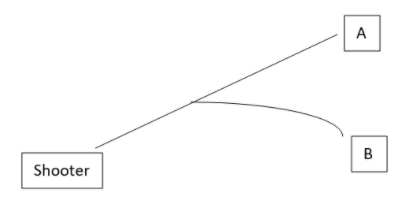Question
Question: A shooter wants to hit a monkey who is hanging from a branch of a tree in position A at some distanc...
A shooter wants to hit a monkey who is hanging from a branch of a tree in position A at some distance away from the shooter. In which of the following conditions the bullet will hit the monkey.

A. The monkey drops himself from the branch to position B, and the shooter aims at position B.
B. The shooter aims at the monkey in position A, and simultaneously the monkey drops himself from the branch to position B
C. The shooter aims at the monkey in position A, and the monkey does not move
D. The shooter aims at position B and the monkey does not move from its position at A
Solution
Don’t assume anything in this question. It is told in the question that the monkey is hanging from a branch of a tree, which indicates that the shooter should aim the monkey directly, so that he can shoot the monkey. If the monkey leaves the branch or not, this is secondary stuff and should not be assumed until mentioned in the question.
Complete answer:
The monkey is hanging from a tree and he is not moving currently. So, if the shooter wants to hit the monkey, then he will directly aim at the monkey at position A and shoot.
There is a possibility of the monkey leaving the tree branch, due to which the shooter will shoot at position B, but the question has not stated anything related to this.
Since, the monkey is not moving from position A, so the shooter will shoot the monkey at position A.
Therefore, the correct answer is Option (C).
Additional Information:
To answer this question, recall that according to Galileo's law, all objects fall with the same constant acceleration of gravity (about 9.8 metres per second per second near the Earth's surface), regardless of the object's weight. Furthermore, horizontal motions and vertical motions are independent: gravity acts only upon an object's vertical velocity, not upon its velocity in the horizontal direction. The hunter's dart, therefore, falls with the same acceleration as the monkey.
Assume for the moment that gravity was not at work. In that case, the dart would proceed in a straight-line trajectory at a constant speed (Newton's first law). Gravity causes the dart to fall away from this straight-line path, making a trajectory that is in fact a parabola. Now, consider what happens if the hunter aims directly at the monkey, and the monkey releases his grip the instant the hunter fires. Because the force of gravity accelerates the dart and the monkey equally, they fall the same distance in the same time: the monkey falls from the tree branch, and the dart falls the same distance from the straight-line path it would have taken in the absence of gravity. Therefore, the dart will always hit the monkey, no matter the initial speed of the dart, no matter the acceleration of gravity.
Note:
This is a tricky question, as someone might assume the monkey will leave the branch after the bullet is shot. So, don’t assume anything until anything is explicitly mentioned in the question. Many students think that monkeys will leave the branch after seeing the shooter, but that is not mentioned in the question.
